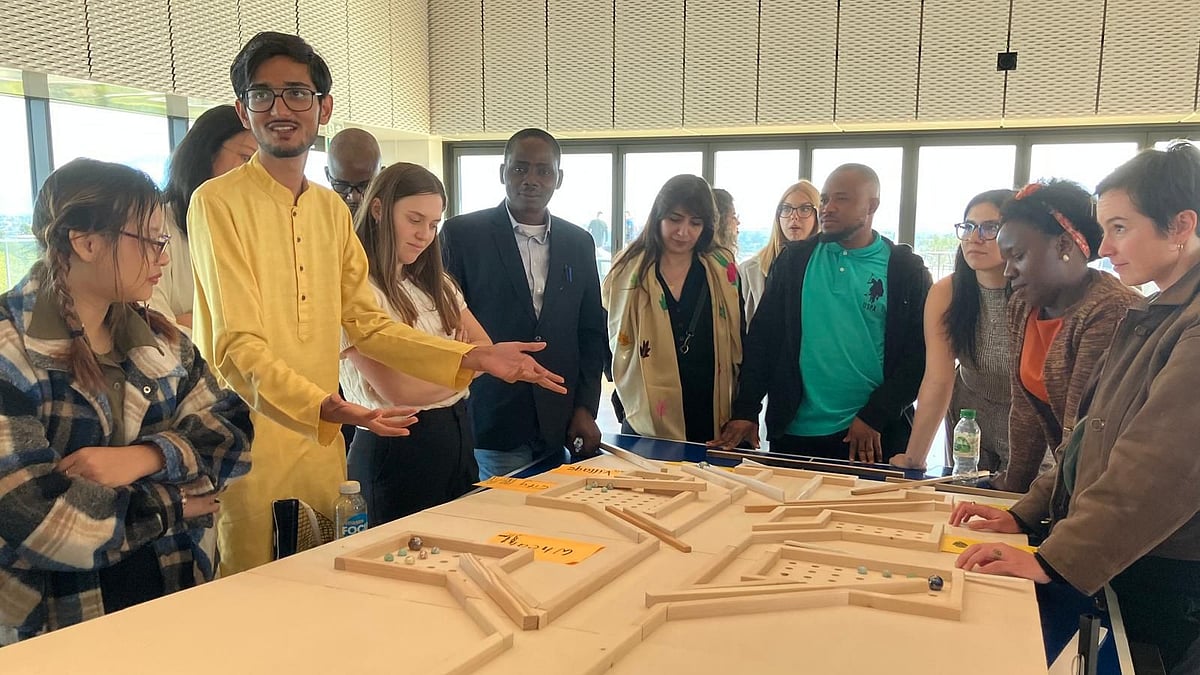Meet Girish Patil, Jalgaon’s Environmental Warrior Who Represented India In Geneva
In an interview with The Free Press Journal, Girish Patil shares his experiences from the programme and discusses various issues such as the water crisis in Israel and Gaza, leadership-related water challenges in African countries, and the Indus Water Treaty between India and Pakistan

Meet Girish Patil: Jalgaon’s Environmental Warrior Fighting For Water & Peace | Sourced
Girish Patil, a Youth Climate Advocate from Jalgaon, has become the face of Maharashtra’s student environmental movement. He is a former student of Fergusson College, Pune, and the Tata Institute of Social Sciences, Mumbai. He is a part of many social and ecological movements in India and leads the Jalgaon Climate Warriors Movement. His environmental advocacy journey began at 16 when he confronted illegal sand mining in the Girna River. For the past four years, he has worked closely with Dr Rajendra Singh, the ‘Waterman of India’ and Ramon Magsaysay Award recipient, whose mentorship has profoundly shaped his approach to water conservation. Through programmes like "Nadi ki Pathshala" and community-driven river restoration, he has engaged more than a thousand young leaders who are now championing ecological restoration across India.
He recently represented India and South Asia at the Programme on Environmental Peacebuilding in Geneva, Switzerland. The programme was organised by the Geneva Water Hub, which is a joint initiative of the Graduate Institute of Geneva and the University of Geneva, to promote peacebuilding through water cooperation.
In an interview with The Free Press Journal, Girish shares his experiences from the programme and discusses various issues such as the water crisis in Israel and Gaza, leadership-related water challenges in African countries, and the Indus Water Treaty between India and Pakistan.
ALSO READ
Q: How did you get selected for the Geneva Water Hub Conference?
A: The programme brings together water policy activists, lawmakers, environmental consultants, and officials from international organisations across different countries. I was invited because of our work at YOGI (Youth Organisation for Green India) so far in India and South Asia. Through the Geneva Water Hub, research and advocacy for “Peacebuilding through Water” are being done to avoid water wars.
Q: What was the main objective of this conference?
A: The main goal was to promote peace through water cooperation and prevent conflicts arising from water disputes and environmental damage happening all around the world due to armed and non-armed conflicts. For instance, we have the Kaveri River water-sharing dispute between Tamil Nadu and Karnataka, and similar situations exist in some African countries. In several regions, due to political instability, an upstream country blocks the water of rivers flowing through others by building dams, creating tension and disputes. The programme focused on how international cooperation and laws can help resolve such conflicts peacefully and how to have conflict sensitivity to avoid such incidents.
Q: What role do international laws play in such situations?
A: When war-like situations arise, such as the Russia-Ukraine war or the Israel-Gaza conflict, two important international laws come into play: International Humanitarian Law and International Criminal Law. Both have provisions to prevent long-term environmental damage. Although these laws exist, environmental issues are not given much attention. Ecocides are happening around the world. Therefore, the Geneva Water Hub has been working for many years to bring environmental discussions into the global spotlight.
ALSO READ
Q: How was your experience participating in this programme?
A: This summit served as valuable training for me. I met influential leaders in the field of water from across the world, including legal experts and ground-level workers. One of the participants was an adviser to the President of Palau, one was heading a UN mission, and one was an Indigenous Youth Climate Activist. We held extensive discussions and consultations on what can be done within the framework of human rights law and international criminal law to avoid conflicts.
Q: What are some real-life examples that were discussed during the conference?
A: The work the Geneva Water Hub is doing in the Sahel region in Africa was a good case study for me. In our case, India’s relationship over water with Pakistan is a good example. India has fought three wars with Pakistan but has never violated the Indus Valley Treaty. After the Pulwama attack, India took strict action against Pakistan. So, we discussed the consequences of such war-like situations and the role of international institutions.
ALSO READ
Q: What is your message to Indian policymakers?
A: All around the country, we are facing a climate emergency. Floods, cloudbursts and droughts are becoming the new normal. But our policies are still rigid. We need better adaptation and mitigation policies. So far, many community initiatives are doing well in India, but we need strong government policies and climate action to address this situation. Otherwise, the distress caused by such incidents may worsen the impact on vulnerable communities that are voiceless in all this discourse.
RECENT STORIES
-
-
-
-
-